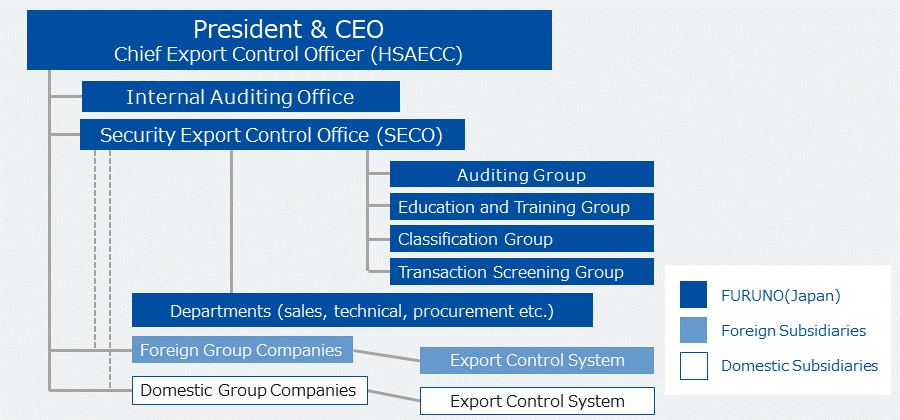Export Control Policy
To contribute to international peace and security Furuno Electric controls its export of products and technology/software in compliance with Foreign Exchange and Foreign Trade Act (Japanese Export Control Law), international laws and applicable foreign laws and regulations.
Organization
To implement the export control, Internal Compliance Program was established. Furuno Electric’s Export Control is headed by the President and managed by the Security Export Control Office (SECO).

Classification
Any goods or technology/software that falls under dual use/munitions control list must be exported under certain authorization including export license by Minister of Economy, Trade and Industry. Classification whether an item hits the dual use/munitions control list is conducted for every item to be exported. Classification sheet, which may be required to clear the Customs, shall be provided by Furuno Electric when requested. Ask sales representative for the classification.
- Note1: Classification may take several days to prepare.
- Note2: Even if an item does not hit the dual use/munitions control list the item is still subject to export control. Such “not list controlled” items fall under Category 16 of Japan’s Export Order and/or Foreign Exchange Order. Category 16 items need export license depending on the destination, end user, end use or Japanese Authority’s requirement. When exporting Category 16 items from Japan Catch-All Control (End Use Control) must be observed.
Transaction Screening
Furuno Electric screens every transaction of goods and/or technology/software to make sure the items are not intended for Concerned Purposes nor destined to Concerned End Users. “Concerned Purpose” means mainly weapons of mass destruction related and conventional weapon related purposes. Conventional weapon includes specially designed vessels for military purposes. Security Assurance & Export Control Committee judges a transaction if 1) the item hits the dual use/munitions control list, 2) there is any concern about the end use or end user, 3) the end user falls under Military End User, 4) the destination hits the concerned region (Export Order Supp. 4 countries and E1 and E2 countries on US EAR Country Group). 5) Japan’s Ministry of Economy, Trade and Industries requires export license. Otherwise the exporting departments screen transactions.
“Concerned End User” includes parties listed in Japan’s, US, EU or UN sanctions list and any Military End Users. Japan’s sanctions list is Foreign User List by the Ministry, Economy, Trade and Industry. US sanctions list includes DPL, SDN, Entity List, etc. which are included in US Government’s “Consolidated Screening List”. “Military End User” includes national armed services (army, navy, marine, air force, or coast guard), as well as the national guard and national police, government intelligence or reconnaissance organizations, or any person or entity whose actions or functions are intended to support incorporating the item into military items.
Export Control Audit
To verify the export control is properly in place internal audit is conducted on regular basis. Domestic and foreign subsidiaries and authorized distributors are also subject to export control audit. If non-conforming is observed correction plan must be submitted. Effectiveness of the audit is evaluated by the Auditing Office.
Education
To make the importance of export control penetrated in the company, SECO issues circular notices and gives training utilizing E-Learning. Effective of such enlightenment is measured by the regular basis internal audit.
Recordkeeping
Record of exports of goods and technology/software are retained according to the law requirement.
Reporting
Any violation of law or suspected violation shall be reported to the Minister of Economy, Trade and Industry and corrective action shall be taken immediately.
Compliance with “deemed export” regulations administered by METI (Japanese Ministry of Export, Trade and Industry)
- 1.In the case of external collaboration, if a member of the project in collaborating partner is recognized as a “specific category person”, we ask the partner to notify us.
If a project member of our company is recognized as a "specific category person ", we will notify the collaborator.
- 2. In the case of temporary employees, if the dispatching company recognizes that a dispatched personnel falls under "specific category person", we ask them to notify us.
- 3. In a subcontractor that undertakes work using technical information from us, if an involved person is recognized as "specified category person“, we ask them to notify us.
*For details, please refer to the ministry's website (search keyword "deemed export controls“, “specific category person") 安全保障貿易管理**Export Control*EnglishPage (meti.go.jp)
Specific category person basically refers to “states in which residents are strongly influenced by non-residents" for export control. METI has categorized it into three types.